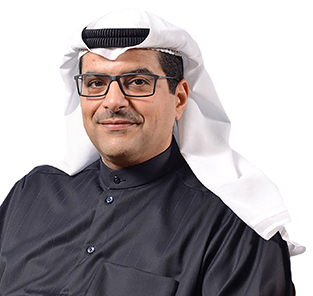The world’s second largest Islamic bank, Kuwait Finance House (KFH), is in rude health. Under the leadership of chief executive Mazin Al-Nahedh, the bank has been working diligently in recent years to focus on core banking activities while exiting its non-strategic investments. This approach has been paying dividends: profits are up, and the bank’s growth forecast, in line with that of the wider Kuwaiti economy, looks favourable. In 2018 the bank’s net profits increased by 23.5% to reach Kd227.4m ($747.5m).
“KFH is consistently progressing towards achieving sustainable profitability by focusing on operating profits from core banking activities, matching revenues from local and foreign markets. KFH’s sustainable profits reached 92% of the total profits recorded in 2018. This proves the success of our strategy in focusing on core banking activities,” says Mr Al-Nahedh.
It is notable that KFH’s 2018 results were achieved in an environment of more subdued growth in its home market. Kuwait’s economy expanded by just 1.7% for the year, although the International Monetary Fund expects an improvement in 2019 to 2.5%. For Mr Al-Nahedh, the bank’s outperformance of the economy is a welcome affirmation of its strategic direction of travel. “KFH’s ability to achieve this high performance amid the relatively weak operating environment confirms the success of its strategy and soundness of its vision,” he says.
A future in technology
Improvements to the bank’s cost-to-income metrics have also played a part in this performance as investments in back- and front-office technologies have started to pay dividends. Indeed, KFH is pushing ahead with a range of new digital offerings to improve its customer service and appeal to the country’s young and growing population. This includes the development of chatbots, which have been deployed across the KFH’s mobile banking app and online portals, as well as the use of cardless cash withdrawals through QR codes or a customer’s mobile phone number or national ID card.
In terms of Kuwait’s back-office improvements, these have largely focused on the use of robotics. “In the back office, we implemented a robotic process automation programme under which we have streamlined our internal processes for customer financing transactions, increasing efficiency and reducing processing time,” says Mr Al-Nahedh.
In this domain, KFH is deploying robotic process automation solutions developed by UK software company Blue Prism and built on Microsoft technologies. This system automates retail credit card applications by implementing a fully automated workflow process. “This makes KFH the region’s first company in the financial services industry to implement a fully automated workflow system for retail credit and enables the bank to empower its employees to better engage customers, optimise operations and transform services,” says Mr Al-Nahedh.
Merger possibility
Beyond technology, more profound changes are afoot. In January 2019, KFH agreed to the terms of a merger with Ahli United Bank of Bahrain, in what would be the first cross-border banking merger in the Gulf Co-operation Council for many years. If completed, the deal would see the creation of the sixth largest bank in the Gulf region with assets in the region of $85bn, according to data from Moody’s. In March 2019 it was announced that due diligence procedures were under way on the deal.
“The final decisions [on the deal] are subject to the approval of the general assemblies of both banks, the central banks, and the relevant regulatory bodies in Kuwait and Bahrain. [We will] announce in a timely manner any new or material developments related to the merger,” says Mr Al-Nahedh.
For the Islamic finance industry as a whole, the merger of the two banks would see the creation of a genuine global heavyweight with cross-continental reach. This would be a first. At present, the business of even the world’s largest Islamic banks is based almost exclusively in one market. As such, both KFH and Ahli United Bank would bring extensive regional footprints, ranging from Turkey to Libya, coupled with the Kuwaiti bank’s presence in south-east Asia.
Meanwhile, in the domestic market, Mr Al-Nahedh remains upbeat about the prospects for Kuwait’s sharia-compliant financial institutions. “Thanks to sustained improvements in [the Kuwaiti economy], rising oil prices and continued government spending under the national development plan, Kuwaiti Islamic banks performed well in 2018,” he says. “According to the latest figures, the growth of the Islamic finance sector over the past five years has outpaced that of conventional banking in Kuwait.”












